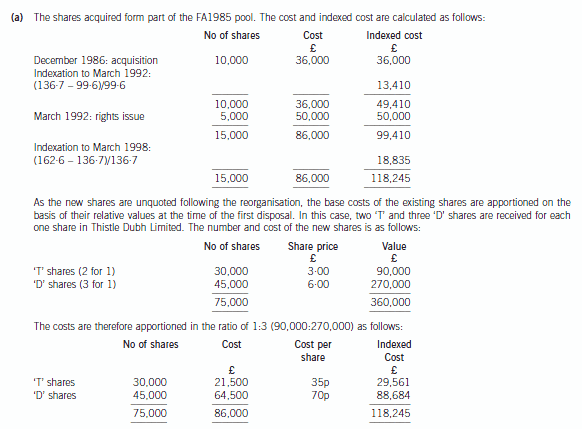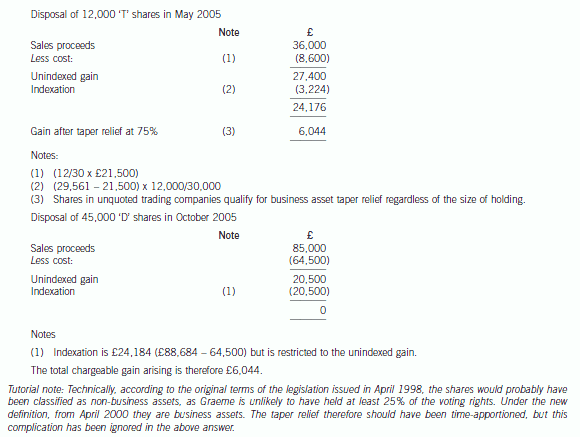accaglobal官网上不去可能是哪些问题?赶紧看看!
发布时间:2020-02-20
关于accaglobal官网上不去可能是哪些问题?不知道的也没关系,下面就跟着51题库考试学习网一起来了解一下吧!
越是到考试时间,越有同学反应,ACCA官网突然上不去了。有的同学顿时慌乱掉了。但这是怎么回事呢?51题库考试学习网分享了几大原因,大家可自行排查一下。
1.浏览器兼容性差,建议使用兼容性更佳的知名浏览器
很多网站的开发设计都会优先解决用户数较多的浏览器的兼容问题,所以全球范围来看选择Google这个没广告没弹窗。一直用Google浏览器,从一开始注册到报名,以及各种ACCA资料上传下载都没有出现过任何错误,而且要记得更新一下软件的版本,你会发现Google大法是真的好。而且搜索也非常干净,你搜ACCA出来的绝对是ACCA全球官网,不会有虚假广告。
2.有点耐心,不要一直点点点
如果网站卡顿你还一直在那点点点...,你的电脑也会因为任务过多CPU爆表而卡死,导致死机状态。关机也不是,不关也不是。所以如果实在没办法提升网速的情况下还是要多点耐心。
3.ACCA付款时页面错误,被扣钱怎么办?
收到银行扣款信息,但是账户仍然显示未付款,这样的情况一般是支付确认失败了。钱会很听话的从哪里来返回哪里去,不过这个需要一点时间,信用卡、支付宝都有各自的结算通道,等待一周左右钱会被退回原账户。
4.考前会有大量的学员登录
临近考试时,会有非常多的学员登录官网,这时官方的负载能力可能会有所下降,导致网站崩溃。遇到此类问题,大家可以尝试稍后一段时间再重试。如果官网一直无法登录,可以联系ACCA代表处。
以上就是51题库考试学习网带给大家的内容,如果还有其他不清楚的问题,请及时反馈给51题库考试学习网,我们会尽快帮您解答。
下面小编为大家准备了 ACCA考试 的相关考题,供大家学习参考。
(c) Suggest ways in which each of the six problems chosen in (a) above may be overcome. (6 marks)
(c) Ways in which each of the problems might be overcome are as follows:
Meeting only the lowest targets
– To overcome the problem there must be some additional incentive. This could be through a change in the basis of bonus
payment which currently only provides an incentive to achieve the 100,000 tonnes of output.
Using more resources than necessary
– Overcoming the problem may require a change in the bonus system which currently does not provide benefit from any
output in excess of 100,000 tonnes. This may not be perceived as sufficiently focused in order to achieve action. It may
be that engendering a culture of continuous improvement would help ensure that employees actively sought ways of
reducing idle time levels.
Making the bonus – whatever it takes
– It is likely that efforts to change the ‘work ethos’ at all levels is required, while not necessarily removing the concept of
a bonus payable to all employees for achievement of targets. This may require the fostering of a culture for success within
the company. Dissemination of information to all staff relating to trends in performance, meeting targets, etc may help
to improve focus on continuous improvement.
Competing against other divisions, business units and departments
– The problem may need some input from the directors of TRG. For example, could a ‘dual-cost’ transfer pricing system
be explained to management at both the Bettamould division and also the Division with spare capacity in order to
overcome resistance to problems on transfer pricing and its impact on divisional budgets and reported results? In this
way it may be possible for the Bettamould division to source some of its input materials at a lower cost (particularly from
TRG’s viewpoint) and yet be acceptable to the management at the supplying division.
Ensuring that what is in the budget is spent
– In order to overcome the problem it may be necessary to educate management into acceptance of aspects of budgeting
such as the need to consider the committed, engineered and discretionary aspects of costs. For example, it may be
possible to reduce the number of salaried staff involved in the current quality checking of 25% of throughput on a daily
basis.
Providing inaccurate forecasts
– In order to overcome this problem there must be an integrated approach to the budget setting process. This may be
achieved to some extent through all aspects of the budget having to be agreed by all functions involved. For example,
engineers as well as production line management in reaching the agreed link between percentage process losses and
the falling efficiency of machinery due to age. In addition, TRC may insist an independent audit of aspects of budget
revisions by group staff.
Meeting the target but not beating it
– To overcome the problem may require that the bonus system should be altered to reflect any failure to control costs per
tonne at the budget level.
Avoiding risks
– In order to overcome such problems, TRC would have to provide some guarantees to Bettamould management that the
supply would be available during the budget period at the initially agreed price and that the quality would be maintained
at the required level. This would remove the risk element that the management of the Bettamould division may consider
currently exists.
Susan is aware of benchmarking as a useful input into performance measurement and strategic change.
(b) Assess the contribution benchmarking could make to improving the position of the Marlow Fashion Group
and any limitations to its usefulness. (8 marks)
(b) Benchmarking at Marlow Fashion will not be an easy exercise. Marlow Fashion has developed a distinctive way of reaching
its markets that means direct comparisons will be hard to make. Certainly, it can carry out historical benchmarking in
comparing how its own processes and activities have improved, or otherwise, over a relevant period of time. Unfortunately,
this is likely to simply confirm worsening performance. It can compare its own key operations against the ‘best in class’;
regardless of which industry the excellent performer comes from. It could and should have been carrying out competitive
benchmarking on the retail side of the business where information should be more easily available. There may be an
opportunity to benchmark itself against firms that have gone through a similar crisis and achieved a successful turnaround.
In terms of the advantages and disadvantages, the willingness of managers responsible for a key area of performance to
compare themselves against relevant external performance measures should make them take responsibility for any changes
necessary. In Marlow Fashion, the acceptance that things have to be done differently will be the first stage in the turnaround.
Getting managers face-to-face with the problems, accepting responsibility for change and recognising that the necessary
changes are ‘doable’ is an important stage in creating a willingness to change. The disadvantages are that every organisation
and situation is different and there is no one best way. Marlow Fashion thought it had discovered the best way and this created
an unwillingness to change. There is also the danger that you are solving today’s problems with yesterday’s solutions. A good
competitor will be trying to maintain its competitive advantage through constantly improving its processes. It also has a vested
interest in trying to prevent its improvements from being revealed to its competitors. Also, many of the ‘softer’ processes –
typically involving people – are difficult if not impossible to replicate in another organisation. These advantages are to do with
culture and leadership and not easily transferable to another organisation and the context in which it is operating.
2 Graeme, aged 57, is married to Catherine, aged 58. They work as medical consultants, and both are higher rate
taxpayers. Barry, their son, is aged 32. Graeme, Catherine and Barry are all UK resident, ordinarily resident and
domiciled. Graeme has come to you for some tax advice.
Graeme has invested in shares for some time, in particular shares in Thistle Dubh Limited. He informs you of the
following transactions in Thistle Dubh Limited shares:
(i) In December 1986, on the death of his grandmother, he inherited 10,000 £1 ordinary shares in Thistle Dubh
Limited, an unquoted UK trading company providing food supplies for sporting events. The probate value of the
shares was 360p per share.
(ii) In March 1992, he took up a rights issue, buying one share for every two held. The price paid for the rights
shares was £10 per share.
(iii) In October 1999, the company underwent a reorganisation, and the ordinary shares were split into two new
classes of ordinary share – ‘T’ shares and ‘D’ shares, each with differing rights. Graeme received two ‘T’ and three
‘D’ shares for each original Thistle Dubh Limited share held. The market values for the ‘T’ shares and the ‘D’
shares on the date of reorganisation were 135p and 405p per share respectively.
(iv) On 1 May 2005, Graeme sold 12,000 ‘T’ shares. The market values for the ‘T’ shares and the ‘D’ shares on that
day were 300p and 600p per share respectively.
(v) In October 2005, Graeme sold all of his ‘D’ shares for £85,000.
(vi) The current market value of ‘T’ shares is 384p per share. The shares remain unquoted.
Graeme and Catherine have owned a holiday cottage in a remote part of the UK for many years. In recent years, they
have used the property infrequently, as they have taken their holidays abroad and the cottage has been let out as
furnished holiday accommodation.
Graeme and Catherine are now considering selling the UK country cottage and purchasing a holiday villa abroad.
Initially they plan to let this villa out on a furnished basis, but following their anticipated retirement, would expect to
occupy the property for a significant part of the year themselves, possibly moving to live in the villa permanently.
Required:
(a) Calculate the total chargeable gains arising on Graeme’s disposals of ‘T’ and ‘D’ ordinary shares in May and
October 2005 respectively. (7 marks)


(c) Illustrate how:
(i) inquiry; and (4 marks)
(c) Due diligence review
(i) Inquiries
Tutorial note: These should be focussed on uncovering facts that may not be revealed by the audited financial
statements (e.g. off balance sheet finance, contingencies, commitments and contracts) especially where knowledge
may be confined to management.
■ Do any members of MCM’s senior/executive management have contractual terms that will result in significant
payouts to them (e.g. on change of ownership of the company or their being made redundant)?
■ What contracts with clients, if any, will lapse or be made void in the event that MCM is purchased from Frontiers?
■ What synergy or inter-company trading, if any, currently exists between MCM and Frontiers? For example, Frontiers
may publish MCM’s training materials.
■ Are there any major clients who are likely to be lost if MCM is purchased by Plaza (e.g. any competitor food
retailers)?
■ What are the principal terms of the operating leases relating to the International business’s premises?
■ What penalties should be expected to be incurred if operating leases and/or contracts with training consultants are
terminated?
■ Has MCM entered into any purchase commitments since 31 December 2004 (e.g. to buy or lease further
premises)?
■ Who are the best trainers that Plaza should seek to retain after the purchase of MCM?
■ What events since the audited financial statements to 31 December 2004 were published have made a significant
impact on MCM’s assets, liabilities, operating capability and/or cash flows? (For example, storm damage to
premises, major clients defaulting on payments, significant interest/foreign-exchange rate fluctuations, etc.)
■ Are there any unresolved tax issues which have not been provided for in full?
■ What effect will the purchase have on loan covenants? For example, term loans may be rendered repayable on a
change of ownership.
声明:本文内容由互联网用户自发贡献自行上传,本网站不拥有所有权,未作人工编辑处理,也不承担相关法律责任。如果您发现有涉嫌版权的内容,欢迎发送邮件至:contact@51tk.com 进行举报,并提供相关证据,工作人员会在5个工作日内联系你,一经查实,本站将立刻删除涉嫌侵权内容。
- 2020-02-05
- 2020-04-17
- 2020-01-10
- 2020-01-10
- 2020-01-10
- 2020-05-15
- 2020-03-25
- 2020-03-08
- 2020-01-10
- 2020-01-14
- 2020-03-18
- 2020-01-10
- 2020-01-09
- 2020-05-07
- 2020-03-29
- 2020-01-09
- 2020-01-10
- 2020-02-27
- 2020-01-10
- 2020-04-20
- 2020-01-10
- 2020-05-13
- 2020-01-09
- 2020-05-13
- 2020-01-09
- 2020-01-09
- 2020-01-09
- 2019-12-31
- 2020-01-10
- 2020-01-10